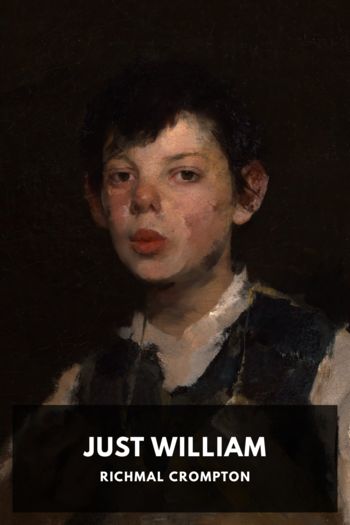Just William - Richmal Crompton (have you read this book .TXT) 📗

- Author: Richmal Crompton
Book online «Just William - Richmal Crompton (have you read this book .TXT) 📗». Author Richmal Crompton
“Police! Help! Murder! Robbers!”
The quiet little street rang with the raucous sounds.
William felt cold shivers creeping up and down his spine. He was in a small back garden from which he could see no exit.
Meanwhile the shrieks were redoubled.
“Help! Help! Help!”
Then came sounds of the front-door opening and men’s voices.
“Hello! Who is it? What is it?”
William glared round wildly. There was a henhouse in the corner of the garden, and into this he dashed, tearing open the door and plunging through a mass of flying feathers and angry, disturbed hens.
William crouched in a corner of the dark henhouse determinedly clutching his bunch of syringa.
Distant voices were at first all he could hear. Then they came nearer, and he heard the fat lady’s voice loudly declaiming.
“He was quite a small man, but with such an evil face. I just had one glimpse of him as he dashed past me. I’m sure he’d have murdered me if I hadn’t cried for help. Oh, the coward! And a poor defenceless woman! He was standing by the silver table. I disturbed him at his work of crime. I feel so upset. I shan’t sleep for nights. I shall see his evil, murderous face. And a poor unarmed woman!”
“Can you give us no details, madam?” said a man’s voice. “Could you recognise him again?”
“Anywhere!” she said firmly. “Such a criminal face. You’ve no idea how upset I am. I might have been a lifeless corpse now, if I hadn’t had the courage to cry for help.”
“We’re measuring the footprints, madam. You say he went out by the front door?”
“I’m convinced he did. I’m convinced he’s hiding in the bushes by the gate. Such a low face. My nerves are absolutely jarred.”
“We’ll search the bushes again, madam,” said the other voice wearily, “but I expect he has escaped by now.”
“The brute!” said the fat lady. “Oh, the brute! And that face. If I hadn’t had the courage to cry out—”
The voices died away and William was left alone in a corner of the henhouse.
A white hen appeared in the little doorway, squawked at him angrily, and retired, cackling indignation. Visions of lifelong penal servitude or hanging passed before William’s eyes. He’d rather be executed, really. He hoped they’d execute him.
Then he heard the fat lady bidding goodbye to the policeman. Then she came to the back garden evidently with a friend, and continued to pour forth her troubles.
“And he dashed past me, dear. Quite a small man, but with such an evil face.”
A black hen appeared in the little doorway, and with an angry squawk at William, returned to the back garden.
“I think you’re splendid, dear,” said the invisible friend. “How you had the courage.”
The white hen gave a sardonic scream.
“You’d better come in and rest, darling,” said the friend.
“I’d better,” said the fat lady in a plaintive, suffering voice. “I do feel very … shaken. …”
Their voices ceased, the door was closed, and all was still.
Cautiously, very cautiously, a much-dishevelled William crept from the henhouse and round the side of the house. Here he found a locked side-gate over which he climbed, and very quietly he glided down to the front gate and to the road.
“Where’s William this evening?” said Mrs. Brown. “I do hope he won’t stay out after his bedtime.”
“Oh, I’ve just met him,” said Ethel. “He was going up to his bedroom. He was covered with hen feathers and holding a bunch of syringa.”
“Mad!” sighed his father. “Mad! mad! mad!”
The next morning William laid a bunch of syringa upon Miss Drew’s desk. He performed the offering with an air of quiet, manly pride. Miss Drew recoiled.
“Not syringa, William. I simply can’t bear the smell!”
William gazed at her in silent astonishment for a few moments.
Then: “But you said … you said … you said you were fond of syringa an’ that you’d like to have them.”
“Did I say syringa?” said Miss Drew vaguely. “I meant guelder roses.”
William’s gaze was one of stony contempt.
He went slowly back to his old seat at the back of the room.
That evening he made a bonfire with several choice friends, and played Red Indians in the garden. There was a certain thrill in returning to the old life.
“Hello!” said his father, encountering William creeping on all fours among the bushes. “I thought you did home lessons now?”
William arose to an upright position.
“I’m not goin’ to take much bother over ’em now,” said William. “Miss Drew, she can’t talk straight. She dunno what she means.”
“That’s always the trouble with women,” agreed his father. “William says his idol has feet of clay,” he said to his wife, who had approached.
“I dunno as she’s got feet of clay,” said William, the literal. “All I say is she can’t talk straight. I took no end of trouble an’ she dunno what she means. I think her feet’s all right. She walks all right. ’Sides, when they make folks false feet, they make ’em of wood, not clay.”
V The ShowThe Outlaws sat around the old barn, plunged in deep thought. Henry, the oldest member (aged 12¼) had said in a moment of inspiration:
“Let’s think of—sumthin’ else to do—sumthin’ quite fresh from what we’ve ever done before.”
And the Outlaws were thinking.
They had engaged in mortal combat with one another, they had cooked strange ingredients over a smoking and reluctant flame with a fine disregard of culinary conventions, they had tracked each other over the countryside with





Comments (0)